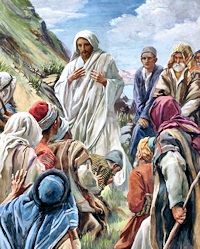Make your gift today!
Help keep Catholics around the world educated and informed.
Already donated? Log in to stop seeing these donation pop-ups.
» Enjoy our Liturgical Seasons series of e-books!
"I give you a new commandment, says the Lord: love one another as I have loved you. "The same mercy which obliged Jesus, innocent as he was, to take upon himself all the crimes of the human race, also obliged him, happy as he is, to take upon himself all our miseries. Just as the most innocent has borne the most sin, so too the most bountiful suffers the most need. He is hungry and he is thirsty; he groans in chains; he labors under maladies; he suffers both heat and cold at one and the same time. Truly poor he is the poorest of the poor, because all other poor persons simply suffer themselves while there is only Jesus Christ who experiences all that men suffer. — Jacques Bossuet
The feast of the Chair of St. Peter, apostle, which falls on February 22, is not celebrated today since Sunday takes priority.
Sunday Readings
The first reading is from the book of Samuel (Sam 26:2, 7-9, 12-13, 22-23) and deals with the relationship between Saul and David. Samuel has anointed Saul as king at God's direction and the people have confirmed it. But some time later Saul has disobeyed God and God has rejected him and has told Samuel to anoint David. Saul, in his jealousy, does everything he can to kill David. David has to flee with Saul in pursuit. Saul has three thousand men and David's band numbers about six hundred. Even though Saul is trying to kill David, David does not reciprocate.
The second reading is from the first letter of Paul to the Corinthians (1 Cor 15:45-49). St. Paul deals with the question: "What reason is there to think that the resurrected body really exists?"
The Gospel reading is from St. Luke (Lk 6:27-38) and continues with Jesus' Sermon on the Mount. Last week we heard the four blessings and the four curses. We now hear Jesus tell us to love our enemy. Our Lord gives us more examples to show us how we should act if we want to imitate the mercy of God. The first has to do with one of what are traditionally called the "spiritual works of mercy" — forgiving injuries and being patient with other peoples' defects.
Things to Do:
- Teach your children the seven spiritual works of mercy, as follows: instruct the ignorant; counsel the doubtful; admonish sinners; bear wrongs patiently; forgive offenses willingly; comfort the afflicted; pray for the living and the dead. Discuss these with your children, asking them for some ideas on how they could practice these works (especially in the family) in their daily lives. Focus on the two mentioned by Our Lord in today's Gospel — to bear wrongs patiently and forgive offenses willingly.
- St. Paul's reading argues that the resurrected body does exist ("So shall we [someday] bear the likeness of the man from Heaven"). Tell your children about the doctrine that our bodies will be resurrected at Christ's final coming. Discuss the characteristics of a glorified body. (This could be fun!) Be sure to read the Catholic Encyclopedia's discussion of General Resurrection, especially the section on the Characteristics of the Risen Body. For a more interesting approach, children who are not too young can universally appreciate the seventh book of the C.S. Lewis' Chronicles of Narnia, The Last Battle, much of which concerns the characters' experience of Paradise, the new Heaven and Earth.
- This is the last Sunday before Lent! Here are two family activities that will help you and your children get into the Lenten mindset in the next three days before Ash Wednesday: the solemn Palm Burning and a ceremonious Farewell to Alleluia.






